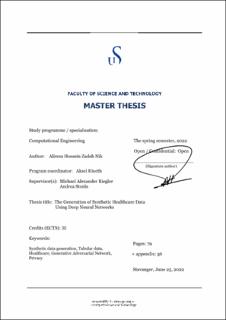| dc.description.abstract | High-quality tabular data is a crucial requirement for developing data-driven applications,
especially healthcare-related ones, because most of the data nowadays
collected in this context is in tabular form. However, strict data protection laws introduced
in Health Insurance Portability and Accountability (HIPAA) and General
Data Protection Regulation (GDPR) present many obstacles to accessing and doing
scientific research on healthcare datasets to protect patients’ privacy and confidentiality.
Thus, synthetic data has become an ideal alternative for data scientists and
healthcare professionals to circumvent such hurdles. Although many healthcare data
providers still use the classical de-identification and anonymization techniques for
generating synthetic data, deep learning-based generative models such as Generative
Adversarial Networks (GANs) have shown a remarkable performance in generating
tabular datasets with complex structures. Thus, this thesis examines the GANs’
potential and applicability within the healthcare industry, which often faces serious
challenges with insufficient training data and patient records sensitivity.
We investigate several state-of-the-art GAN-based models proposed for tabular synthetic
data generation. Precisely, we assess the performance of TGAN, CTGAN,
CTABGAN and WGAN-GP models on healthcare datasets with different sizes,
numbers of variables, column data types, feature distributions, and inter-variable
correlations. Moreover, a comprehensive evaluation framework is defined to evaluate
the quality of the synthetic records and the viability of each model in preserving
the patients’ privacy. After training the selected models and generating
synthetic datasets, we evaluate the strengths and weaknesses of each model based
on the statistical similarity metrics, machine learning-based evaluation scores, and
distance-based privacy metrics.
The results indicate that the proposed models can generate datasets that maintain
the statistical characteristics, model compatibility, and privacy of the original ones.
Moreover, synthetic tabular healthcare datasets can be a viable option in many
data-driven applications. However, there is still room for further improvements in
designing a perfect architecture for generating synthetic tabular data. | |
